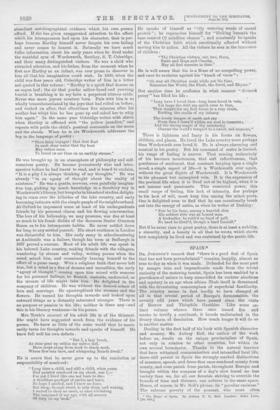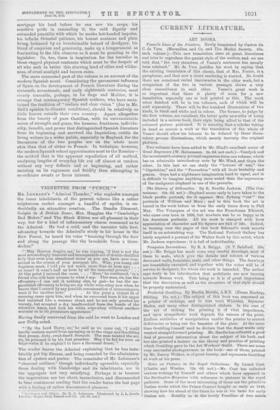SPAIN.*
DR. JOHNSON'S remark that "there is a good deal of Spain that has not been perambulated" remains, happily, almost as true to-day as when it was made. Defended for the most part by meagre inns and impracticable roads from the trivial curiosity of the motoring tourist, Spain has been enabled by a providence of nature to keep unmodified its curious aloofness and mystery in an ago when ultiana Thule itself is threatened with the devastating commonplace of superficial familiarity. The country seems in fact hardly to have changed at all in that crucial period of Europe's fermentation, the seventy odd years which have passed since the visits of Borrow and Theophile Gauthier. Like some ex- tinct volcano whence there once issued Ere and smoke to terrify a continent, it broods undisturbed in the dreary charin of desolation. How much longer it will do so is another matter.
Dealing in the first half of his book with Spanish character and scenery, Mr. .Aubrey Bell, the author of the work before us, dwells on the unique provincialism of Spain, not only in relation to other countries, but within its own several boundaries. Thanks to the natural barriers that have withstood communication and intensified local life, there still persist in Spain the strongly marked distinctions of manners, speech, and dress that once sundered county from county, and even parish from parish, throughout Europe, and brought within the compass of a clay's slow travel no less variety than we, for all our feverish striving to override the bounds of time and distance, can achieve in the same space. Hence, of course, in Mr. Bell's phrase, its "peculiar raciness." The extreme poverty of the peasant, who must often • Tha Magic of Spain. By Aubrey P. 0. Boll. London: John Laney De. net,]
mortgage his land before he can sow his crops, his senaitive pride in concealing it, the cold dignity and outmoded punctilio with which he masks hot-headed impulse, his infinite Oriental patience, his honest neatness and plain living, balanced by au irreclaimable hatred of drudgery, his blend of suspicion and generosity, make up a temperament as fascinating to the idle observer as it must be puzzling to the legislator. So, too, there is inspiration for the traveller in those ragged physical contrasts which must be the despair of all who seek to better this starving land of cities and wilder- ness, of cruel sunlight and barren rains.
The more connected part of the volume is an account of the modern Spanish novel. Considering the paramount influence of Spain on the development of French literature during the sixteenth, seventeenth, and early eighteenth centuries, most clearly traceable, perhaps, in Le Sage and Mare, it is strange that contemporary Spanish authors, who have main- tained the tradition of "realism and clear vision" (due in Mr. Bell's opinion to climatic conditions), should be relatively so little known outside their own country. Apart altogether from the beauty of pure Castilian, with its untranslatable union of strength and grace, the humour, frankness, individu- ality, breadth, and power that distinguished Spanish literature from its beginning and survived the Inquisition, entitle its living writers to a wider public, especially in England, for the literatures of the two peoples are on the whole more akin than that of either to French. In technique, however, the modern Spanish school approximates most to the Russian— the method that is the apparent repudiation of all method, analysing lengths of everyday life cut off almost at random without any very definite end or beginning, and rather insisting on its vagueness and fluidity than attempting to co-ordinate events or focus interest.























































 Previous page
Previous page